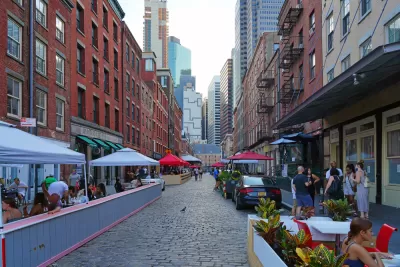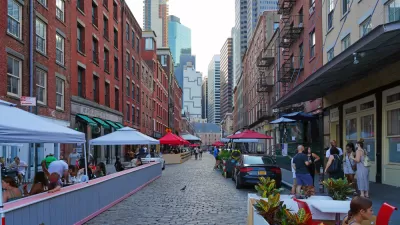The ongoing political controversy about the priorities of the public realm in New York City is likely to last into the next mayoral administration.

Winnie Hu reports that New York City's ongoing battle over the public space reclaimed from automobiles during the pandemic is likely to be determined by the next mayor.
As Planetizen has detailed repeatedly during the pandemic, New York City has led the charge of cities turning over street and parking spaces to human-powered uses like open streets for walking and playing, outdoor dining, and new dedicated bus lanes. While the empty streets of the early pandemic created an opportunity to repurpose space previously devoted to automobile travel and storage, the stage for the current conflict was being set by record levels of New Yorkers buying new cars during the pandemic.
George Arzt, a political consultant and former press secretary to Mayor Edward I. Koch, is quoted by Hu explaining that the controversies surrounding car space in the post-pandemic city is creating "a real migraine" for the city's mayoral candidates as the Democratic primary, scheduled for June 22, approaches.
Meanwhile, traffic safety in the city, like the rest of the nation, got worse in 2020 and continues to see heightened levels of danger in 2021. According to Hu, "There were 99 traffic-related fatalities reported as of May 31, the highest number in that five-month period since 2013…"
To get a better idea of how each of eight leading candidates for the office of mayor would act regarding cars, traffic safety, and transportation equity, Hu and the New York Times sent written questions, summarizing the answers in the source article below. Hu reports universal support among the respondents for congestion pricing and additional bike lanes as well as mixed support for the expansion of the Citi Bike shared-bike system and the expansion of the city's open streets program to low-income and minority neighborhoods. Hu also shares responses to questions about curb management and traffic safety technology.
FULL STORY: Whose Streets? The Next New York Mayor Will Have to Decide.

Planetizen Federal Action Tracker
A weekly monitor of how Trump’s orders and actions are impacting planners and planning in America.

Map: Where Senate Republicans Want to Sell Your Public Lands
For public land advocates, the Senate Republicans’ proposal to sell millions of acres of public land in the West is “the biggest fight of their careers.”

Restaurant Patios Were a Pandemic Win — Why Were They so Hard to Keep?
Social distancing requirements and changes in travel patterns prompted cities to pilot new uses for street and sidewalk space. Then it got complicated.

Albuquerque Route 66 Motels Become Affordable Housing
A $4 million city fund is incentivizing developers to breathe new life into derelict midcentury motels.

DC Area County Eliminates Bus Fares
Montgomery County joins a growing trend of making transit free.

Platform Pilsner: Vancouver Transit Agency Releases... a Beer?
TransLink will receive a portion of every sale of the four-pack.
Urban Design for Planners 1: Software Tools
This six-course series explores essential urban design concepts using open source software and equips planners with the tools they need to participate fully in the urban design process.
Planning for Universal Design
Learn the tools for implementing Universal Design in planning regulations.
Heyer Gruel & Associates PA
JM Goldson LLC
Custer County Colorado
City of Camden Redevelopment Agency
City of Astoria
Transportation Research & Education Center (TREC) at Portland State University
Camden Redevelopment Agency
City of Claremont
Municipality of Princeton (NJ)





























